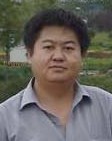
Associate Professor
Institute of Physical Electronics
Research Interests: Scanning probe microscopy, resistive switching memories, nanomaterials
Office Phone: 86-10-6276 2444
Email: zyshen[at]pku.edu.cn
Shen, Ziyong is a associate professor in the School of Electronics. He obtained his B.S. and Ph.D from Lanzhou University in 1992 and 1998, respectively. His research interests include scanning probe microscopy and applications, resistive switching materials and memory devices, nanomaterials and nanoelectronics.
Dr. Shen has published more than 60 research papers. He was awarded“AnTai Teacher Award”in 2003. He is the principal investigator of three NSFC projects and also participated in other projects as a team member including Key program of NSFC and 973 Program. His research achievements are summarized as follows:
1) Scanning probe microscopy and applications: The major research topic in this field is to develop new SPM methods to meet the requirement for manipulation and characterization of nanomaterials. He proposed an in situ splitting technique for SWCNT bundles with an AFM. He developed a new method to position the STM tip on a small piece of graphene sheet on an insulated substrate, revealing the aligned growth mechanism of SWCNT on the graphene surface.
2) Resistive switch (RS) materials and devices: The stochastic nature of conductive filament (CF) generation is the main difficult for the investigation and application of RRAM. He utilized conductive AFM tip as a movable top electrode to realize the probe of single CF and proved grain boundaries is preferential sites for resistive switching of oxide films. He explained the forming-free and unipolar RS of yttrium oxide with thermochemical mode and realized the modulation of RS properties by oxygen pressure in deposition and current compliance in set process.
3) Nanomaterials and nanoelectics: The major research topic in this field is to explore the structural and electronic properties of nanomaterials to develop their application in nanoelectronics. He investigated divalent and trivalent endohedral metallofullerenes at the single molecular level by STM and proposed charge transfer and orbital hybridization mechanism for the interaction between enclosed metal atom and fullerence cage.




